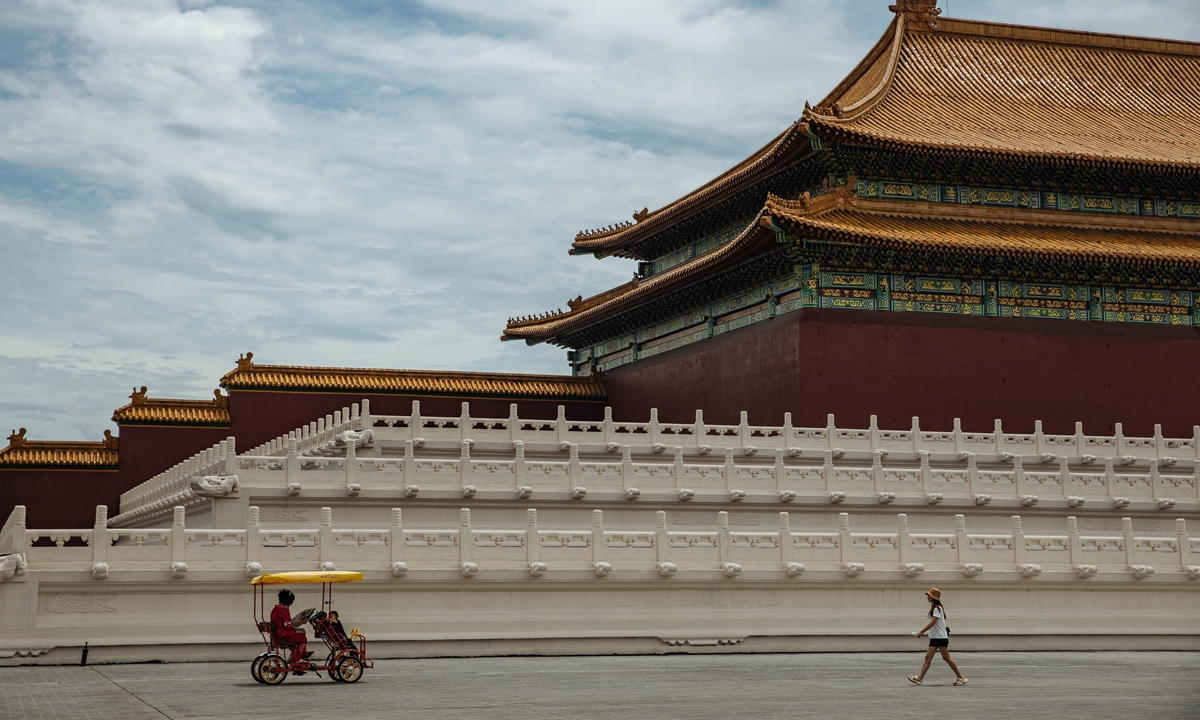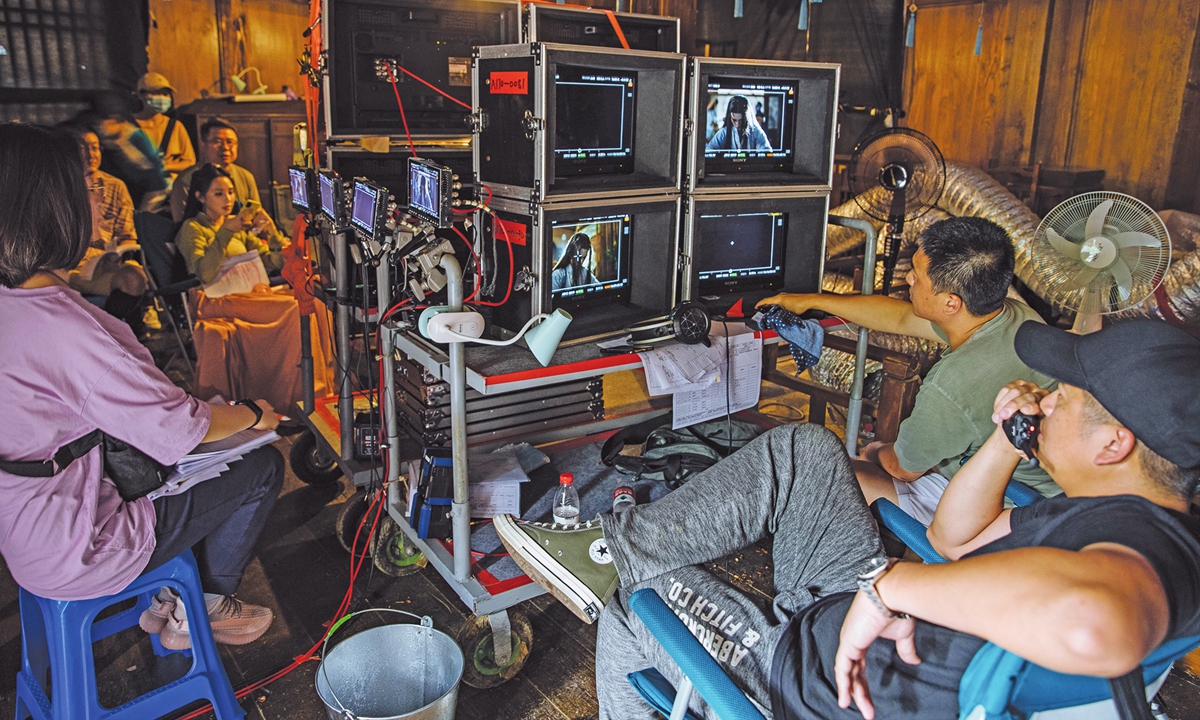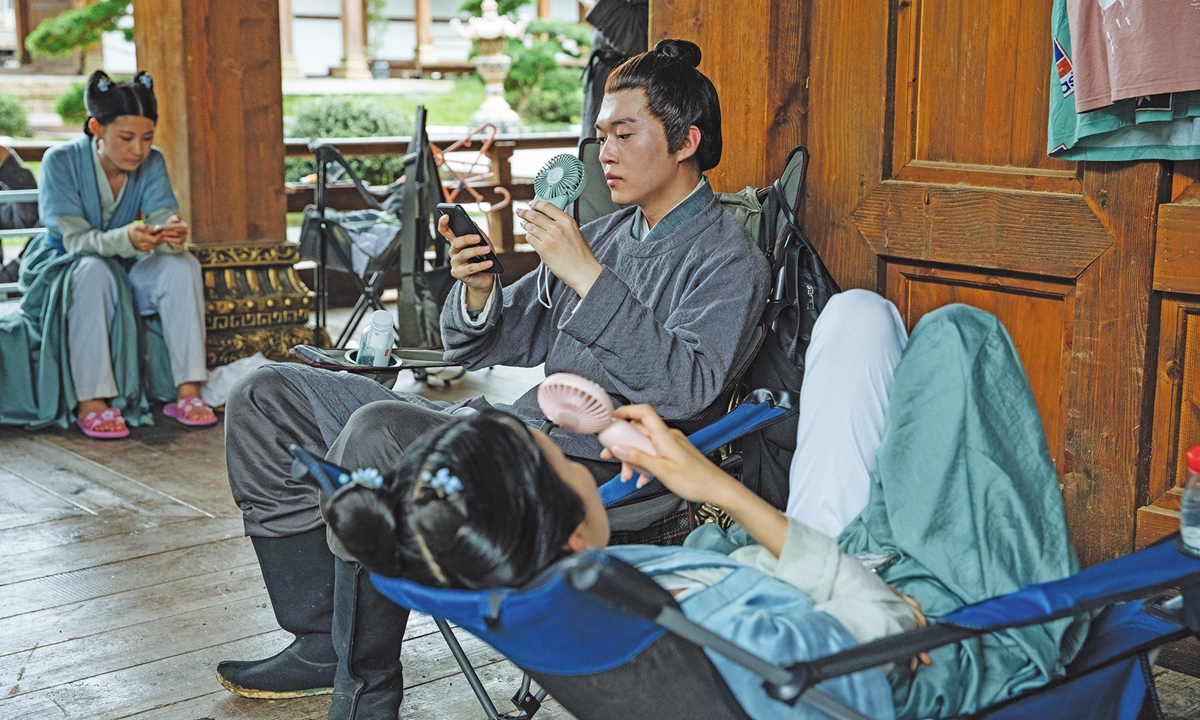
A recreation of Beijing's Forbidden City in Hengdian World Studios in Zhejiang Province Photo: Li Hao/GT

A shoot at Hengdian World Studios Photo: Li Hao/GT

Extras take a break between scenes while shooting at Hengdian World Studios. Photo: Li Hao/GT
Walking down a street at Hengdian World Studios, China's equivalent to Hollywood, at least seven different film crews can be seen busily going about shooting films or TV shows, while performers dressed in various period costumes are everywhere.
Located in East China's Zhejiang Province, China's largest film base boasts recreations of numerous historic locations such as a town from the Spring and Autumn Period (770BC-476BC), the Forbidden City and Ming (1368-1644) and Qing (1644-1911) dynasty palaces.
Surprisingly, though the summer temperatures have reached 38 C, crews are still working everywhere throughout the base. Currently, a total of 111 film crews are working on productions, including an adaptation of Hugo-award-winning writter Liu Cixin's novel
The Three-Body Problem.
"There are 48 crews are shooting in Hengdian World Studios while 63 are in preproduction," Zhao Handan, an employee at the studio, told the Global Times.
"The highest number of crews working at the studios have reached 40 to 50 in previous years, but this year, it has broken a record," Wang Yunhai, a prop master who has worked at Hengdian for four years, told the Global Times.
Playing it safeYuan Xiaomu, producer of the costume drama
Huanxisha, told the Global Times that 70 percent of film crews in mainland China are now based at Hengdian World Studios. He noted that the COVID-19 outbreak has caused serious production issues for his team.
Huanxisha was originally scheduled to begin filming in March but they had to delay filming until July due to the outbreak, which lead to huge monetary losses and cast changes.
According to Yuan, a small group of crew members arrived in Hengdian Township back in February for preproduction, they were soon trapped there as the country introduced measures to restrict the spread of novel coronavirus.
The film base helped the crews by implementing various measures such as halving accommodation prices, offering discounts at dining facilities and providing 24-hour service at the base's hotel.
Current anti-epidemic measures in Hengdian have been very helpful especially for directors and actors from the Hong Kong Special Administrative Region, as people from the region can quarantine and get nucleic acid testing in Hengdian for free.
The resumption of filming at the base has attracted the interest of some foreign producers.
He Xiaojian, a customer service manager at Hengdian World Studios, told the Global Times that some foreign producers have asked him about how to apply for Chinese-foreign co-productions.
"We are the largest filming base in China, and they are very interested," he noted.
Post-epidemic industry Though the coronavirus epidemic has disrupted many productions, it has also given crews more time to polish scripts and better streamline filming, Xie Ying, a manager at Chinese streaming company Youku, told the Global Times.
"The epidemic has reshuffled China's film and television industry. In the future, the number of films and dramas might be reduced. As shoddy works lose out in the competition, more high-quality works will be produced," said Xie.
Many Chinese film experts, including Xie and Yuan, said that the impact of the epidemic will lead to more realistic film and TV productions such as anti-epidemic and natural disaster works being rushed into production in the near future.
"The difference between a hero and a normal person is whether, when the times comes, he or she has the courage to stand out while others do not," Yuan said, noting that he plans to produce some works about the epidemic.
He added that most of his friends in the industry have changed after returning to work.
"After experiencing the virus crisis, many of us deeply feel the honesty, kindness and the beauty of life. Actors have become more easy-going, and are interacting more with the staff around them. All of us treasure our lives and work more because we truly know that a disaster may not be that far away."
Since uncertainty about a second wave come winter is still high, most crews have been working to push their film schedules forward.
"I can feel that no one dares waste any time while filming since sets are in high demand," said Xie.
Most people told the Global Times that the resumption of work at the studios show that the Chinese film and television industry is already on the road to recovery.
However, many Chinese film experts have said that confidence in the Chinese film industry doesn't necessarily extend to industries overseas, especially Hollywood.
"Our recovered Chinese film industry cannot give them [Hollywood] confidence, since the US government needs to bring the coronavirus under control in order to help the industry recover," film and TV producer Gao Yuan told the Global Times.
It seems confidence is low when it comes to a return to normalcy in the US film industry. On Tuesday, Disney announced that live-action blockbuster Mulan will debut on Disney+ on September 4 instead of going to cinemas in the US.






